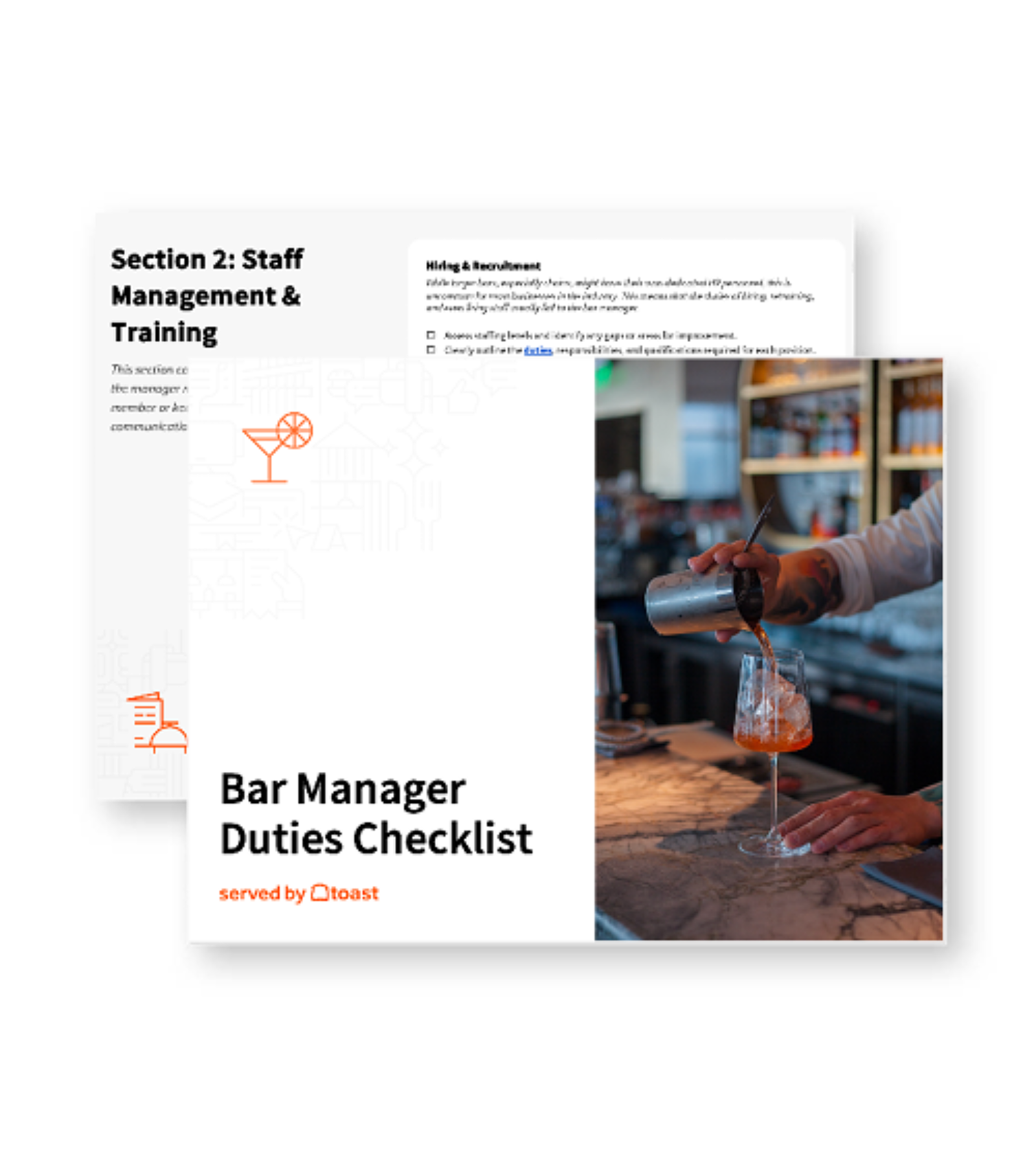
How to Succeed as a Bar Manager
Ready to take the next step in a career behind the bar? Learn how to set yourself up for success as a bar manager, with advice from storied bar pros.

Tyler CumellaAuthor


Bar Manager Duties Checklist
Use this free checklist to help streamline daily tasks, make sure weekly duties get completed, and ensure your bar manager stays organized.
Get free downloadAfter working as a bartender for a number of years, you’re bound to ask yourself: What’s the next step in my career?
Like many people in the hospitality industry, bartenders often wonder about professional development and upward mobility. Where will this job take me? Does this role provide me with career opportunities? Will it ultimately lead to a bar manager position?
Taking stock makes perfect sense. No one wants to be stuck in the same position forever, without a way to get ahead.
If you’re lucky, your employer will actively encourage your professional development by offering access to educational courses and other helpful resources. Other times, you have to take your career into your own hands. And if the bar is the place for you, it could involve taking proactive steps towards a bar manager position.
Opening a Bar Checklist
So many things go into opening a bar. With this free PDF checklist, you'll set your new business up for success.

Establishing a Long-Term Career Behind the Bar
Sam Treadway’s first bartending job was at the Cheers bar in Boston. Now he owns backbar in Somerville, Massachusetts, a tucked away haven for unique craft cocktails. After years spent climbing the ladder, Sam is candid with us — being a bar manager has its fair share of pros and cons.
First, the pros: “Depending on the place, you'll get creative license to form a bar that you'll be proud of. You get to hire and train bartenders to your standards. You keep the bar clean the way you want it. Maybe you even get to pick the lighting and music to create the ambiance you like. You get to curate beer, wine, and cocktail lists to entice your guests and guide them into what the restaurant or bar is all about.”
But then there are the very real cons: “It’s all a ton of work and rarely will you get paid adequately for all that hard work. You have to be able to do every person's job as well as your own. You can't just be a good bartender. You have to be organized, with administrative skills like Excel, InDesign, and all sorts of other software and technology.”
Jared Sadoian, too, has a storied career in the industry. He started his hospitality career as a barback at Eastern Standard in Boston, then worked as a junior bartender at Craigie on Main a few years later, after escaping a career in investment banking in New York City. He then worked as Craigie’s head bartender, and later hopped on over to The Hawthorne to be their next bar manager. He’s still bar manager at The Hawthorne, but has added assistant bar director to his responsibilities. And like Sam, Jared’s familiar with the pros and cons of the position.
Jared says, “There are a lot of challenges to moving into a bar management role, but I think the biggest ‘con’ for most new bar managers is the lack of time spent doing what they probably enjoyed doing so much before — making drinks! Now that we have an environment where you can make a career in beverage, a lot of folks who are interested in drinks but not necessarily passionate about the guest-facing aspects of the job are getting into bartending. Moving into a managerial role strips that entirely out, so that can come as a big shock to folks who take on bigger roles without fully evaluating whether or not they will like that sort of work.”
But Jared finds ways to flip any cons into positives. “Nowadays I find a lot of joy in empowering our front-line employees to make a difference in the experience of our guests while in our space,” says Jared. “Instead of being directly involved in those hospitality moments when I was a bartender, I have learned to appreciate those moments as instructive to our staff — seeing the excitement of a server who got a table to try something new (and they loved it), learning about and connecting with our regulars, and turning new, uncertain guests into regulars.”
Whether you’re facing the pros or the cons, the good or the bad, taking on a bar manager position is one of many necessary stepping stones to building a long and sustainable career behind the bar. Sam tells us, “You have to learn it all and do it all if you want to own your own bar or restaurant at some point.”
Still itching to take on the responsibilities (and some of the headaches) inherent in upper management? Before we plot your path to success, let’s get some basic questions out of the way to prepare you for the road ahead.
What is a Bar Manager?
Bar managers are tasked with keeping their bars running smoothly by handling day-to-day operations, as well as managing resources and employees, and creating a safe, on-brand environment for staff and guests. And that’s just for starters.
Let’s take a look at a sample bar manager job description from Bella Luna & The Milky Way, a bar and restaurant in Jamaica Plain, Massachusetts.
Position overview:
“We are looking for a high-energy, detail-oriented manager to lead our Bar Team. This individual will share our commitment to hospitality with a purpose, and enjoy working in a fast-paced, high-volume neighborhood restaurant with entertainment. The bar manager will work closely with the owners and Management Team to ensure the long-term success of Bella Luna & The Milky Way.”
Responsibilities and requirements:
- Manage the bar team for success
- Work closely with the kitchen team and front of house team, interact with guests, give direction to other staff members, and trouble-shoot to resolve problems
- Oversee day-to-day operations of the bar, including night-time events
- Participate as part of the leadership team of Bella Luna
- Run an efficient and profitable bar
- Maintain written recipes and accurate menu information
- Have excellent mixology skills and experience in high-volume venues
- Order, receive, and manage all bar products
- Conduct an accurate inventory
- Keep bar sales growing, meet quarterly sales targets, and implement sales promotions at the bar
- Develop weekly bar specials and seasonal new bar menu items to create customer excitement
- Maintain a clean, well-organized, and fully stocked bar
- Close Bella Luna & The Milky Way, following all procedures to ensure the entire venue is safe and secured at the end of the shift
Needless to say, specific responsibilities and level of experience will depend on the bar or restaurant. So go ahead and do research on spots in your local area — see what they’re looking for in a bar manager resume. Some might require a college education and specific training, others might not. It all depends, so poke around and see what’s out there.
And chances are there are opportunities for you to get promoted where you already work, too. Sam tells us that, at backbar, he usually promotes people from within, looking for specific qualities in his employees. “I've looked for people who have shown leadership qualities, as well as shown that they care about systems and how things get done. Basically, if you show that you care and you prove you're capable, I’ll add on responsibilities until you're ready to run the bar.”
For more information on bar manager responsibilities, duties, qualifications, and skills, check out this helpful overview from Indeed.
Average bar manager salary
According to data from Indeed, the average bar manager salary is $45,072 per year in the United States. Compare that to the average salary of a bartender, which is $11.76 per hour, according to data from Indeed. This doesn’t include the average additional compensation of a bartender attributed to tips, which is $150 / day worked.
A bar manager’s salary depends on a number of factors, including bar concept and size, annual revenue, and city and location. Here’s a quick look at the average bar manager salary in a few major U.S. cities:
Houston: $43,133 per year
New York City: $56,120 per year
Chicago: $47,997 per year
Los Angeles: $52,682 per year
Again, these numbers vary widely from city to city, so it’s always best to do specific research. Googling “average bar manager salary in [YOUR CITY OR TOWN]” is a good start. Indeed and Glassdoor offer tools to help you search average bar manager salaries in your area.
You can also talk to people who work as bar managers in your city or town to get their firsthand perspective. See if they’d be comfortable sharing what their average pay looks like.
Bar Manager Duties Checklist
Use this free checklist to help streamline daily tasks, make sure weekly duties get completed, and ensure your bar manager stays organized.

How to Succeed in Bar Management
Now that we’ve established what a bar manager is, let’s cover ways you can secure a position, and really take the job by the horns.
Take bar management training courses.
You don’t always need a formal education or certification to be a bar manager. More often than not, bar managers got where they are and learned the business through years of hard work, experience, and networking.
That was the case for Jared Sadoian. He tells us, “I credit my experience at Craigie with a lot of my ‘on-the-job’ learning, as well as programs I've participated in like Camp Runamok (a summer camp for bartenders on the Bourbon trail) or Portland Cocktail Week that have given me an opportunity to connect with other leaders from around the country and be able to share experiences and knowledge. The community of friends I am in contact with daily is an invaluable resource for advice and perspective.”
The learning power of experience and community is undeniable. But if you’d like a more concrete understanding of how to manage a bar, there are training courses you can take, many of which are online.
Here are a few different online options for bar management trainings, courses, and certifications:
You can also talk to your employer to see if they’d be willing to help fund your professional development. An investment in your future only increases the chances that you’ll stick around and remain loyal.
Have a full understanding of bar operations.
To be an effective bar manager, you need to understand the full scope of bar operations and how everything comes together. So use your current job as an opportunity to practice, by looking at everything through the eyes of a bar manager.
Study the bar’s brand, concept, and positioning. Why did the owner open the business in the first place? What inspired them? What does the bar mean to customers, employees, and the community? What’s the owner trying to accomplish with the bar (outside of earning a profit)?
Meet with the leadership team, and don’t be afraid to ask questions. A clear understanding of the bar’s brand and its positioning is foundational to success as a bar manager.
Shadow staff members on the team, to better understand what role everyone plays in the bar’s success. What are their favorite parts of the job? What don’t they like, or what would they change? What are their challenges or pain points? Not only does this help build a stronger rapport with the team and shows that you care, it also gives you an inside look at the bar’s people operations. Ideally, it’ll spark ideas for ways you can help amplify what the team already loves about their jobs, and how you can work to solve their problem areas.
Another way you can become more involved is to help create menu items that shore up profitability. This involves diving into the world of menu engineering, a method of evaluating current and future menu pricing by using your bar’s sales data to influence design and content decisions. It’ll get you thinking about which menu items are profitable and popular, and which are negatively impacting the bar.
Familiarize yourself with how the bar handles operational tasks, like ordering, inventory, payroll, and marketing. What are the processes in place? What bar inventory management system should be used? What’s been successful and what hasn’t? How will you work to improve things?
Having a firm grasp on these different areas of bar operations — and how you envision yourself pitching in and making improvements — will set you up for success.
Find a great mentor.
One of the most common characteristics of successful bar and restaurant leaders is collaboration, and the willingness to learn from more established mentors.
Not only will a great mentor provide advice and words of wisdom, they can set you up with industry connections, and help steer you away from any mistakes they might’ve made in the past.
When you’re just getting started in the industry, you’ll often find your mentors in supportive owners and managers. But don’t be afraid to actively seek out people who might make strong, willing mentors — people you’d be excited to learn from.
On the path from bartender to manager to owner, Sam Treadway had his fair share of mentors. “I'd say I learned the most from John Gertsen, the longtime bar manager at Drink, who hired me on the opening bar staff. I learned what's most important, which is taking care of the guest. If you keep that in mind at all times, then other decisions and tasks are easier to see. But I definitely learned a ton from other legends of the Boston cocktail revival: Jackson Cannon, Misty Kalkofen, and Scott Marshall, to name a few. Each of them taught me different, specific things that all came back to the same core ideas: creating a memorable experience for guests, and making them happier than when they arrived at your bar.”
Same goes for Jared Sadoian. “If Jackson Cannon hadn’t taken a chance on a stupid 21-year-old cocktail nerd at Eastern Standard, I might not even be a part of the industry,” says Jared. “Today I am fortunate to work closely with him on a variety of projects, but stewarding The Hawthorne into the years forward has been a big part of our joint work together. I learn something new just about every time I talk to that guy.”
Many times, what inspires and motivates people looking to make a career out of bartending and bar management are the people they surround themselves with. Like Sam and Jared, you can just as easily learn from inspirational, encouraging leaders, as long as you keep an open mind, be willing to learn from everyone, and do your research. You never know who you might meet, whether by outright action and networking or by chance.
Know your local market.
Knowledge of bar operations and the industry as a whole will give you a strong foundation. But it’s equally important to study your local market, and the role it plays in your bar’s success.
So ask yourself: Who’s your target audience? What do they look for in a bar? Who are your competitors and how are they bringing in guests? Is there a hole in the market you can help fill?
In Boston, a number of wine bars have opened over the past few years that have effectively addressed these questions. Haley Fortier, owner and operator of haley.henry and nathálie wine bars, saw a gap in the market for not only a wine scene but a wine scene rooted in small production, natural, and female-produced wines. Rebel Rebel, owned by Lauren Friel, has received massive acclaim in a short amount of time in business, with a similar focus on small production, natural, and female-produced wines, a lack of stuffiness, and feminist-leaning activism. Their success can be attributed to an array of reasons, but two stand out: They identified a gap, and they filled said gap, using a purposeful mission as the bedrock.
You might be able to create similar demand by hitting the streets and doing the research. Chat with people in your community to understand what they look for in a bar — and what keeps them coming back. Do they go to bars for a particular mood or atmosphere? Are they looking for craft cocktails or more affordable classics? Do they go for the crowd the bar attracts? Always keep learning. It’ll only make you better at your job, and help you stay in touch with the community.
Take care in your hiring.
A bar’s employees are the face of the business. That’s why, as a bar manager, it’s important for you to hire deliberately, and practice care in the hiring process.
If a bartender or server rubs a customer the wrong way and misrepresents the bar, the customer may never come back. And chances are they’ll leave a negative review online.
Even the best employees make mistakes, and have the occasional mess-up or bad experience with a difficult guest. What matters is how your staff is able to recover from such moments, and this usually comes down to attitude and behavior.
When hiring for your team, you may be tempted to go with the person who has impressive experience at big-name bars. While experience is important, focus on hiring for personal values and attitude, and not solely for skill. Believe us, team dynamic, personality, and work ethic are a lot harder to teach than the best pouring methods.
Join your staff on the front lines.
Just because you become a bar manager doesn’t mean your bartending duties are over.
Not only does pitching in keep the ship running smoothly, it gives you greater understanding of the experiences of both your staff and your customers. You’ll learn a lot more than you could if you just stood and observed from afar.
Building positive rapport with members of your team can boost morale, and turn them into loyal advocates for your restaurant brand. And mingling with guests is a great way for you to develop customer relationships and collect feedback. Listening to and establishing a more personal connection with customers can turn them into happy regulars.
Build and amplify your bar’s brand and presence.
We all know it’s cheaper to drink at home. So how can you help your bar be more than just a place that serves drinks? How can you keep people coming through the doors and back for more?
Provide experiences like trivia nights and live music featuring local artists (with proper permits in place, of course). Run contests and create customer loyalty programs to drive engagement. Get involved in the community and participate in local causes and events. Create a unique social media presence that amplifies your brand and builds an engaged audience.
Creating online and offline experiences will give your bar’s brand a boost, and help customers perceive your establishment as more than just a place to grab drinks. Check out this article for a more in-depth look at bar marketing and promotion ideas to attract new customers and keep them coming back for more.
Don’t lose sight of laws and regulations.
When you're swept up in the day-to-day operations of bar management, you can lose track of some of the big details. Make sure you stay on top of your bar’s licenses, permits, and professional certifications. Always be ready for health inspections, and keep an eye on food and drink safety. Get new team members trained and certified quickly.
Be fully aware of local laws and regulations and ensure that your bar is always operating under these legal requirements. Failure to abide by your local laws and regulations can result in fines, lost profits, legal actions, or even the closing of your bar. For more information on small business licenses and permits, visit this helpful resource from the U.S. Small Business Administration.
When you’re surrounded by the right tools, resources, and people — and a can-do attitude to get you there — you can expect to stress less and thrive more as a bar manager. Just make sure you’re ready for the headaches. The headaches aren’t fun, but they are a necessary part of building a longstanding career in the industry. “In a more nebulous way, management presents a very different set of challenges to simply bartending for life,” Jared Sadoian tells us. “From the management of personalities, egos, and emotions of your staff, to the puzzle of how much inventory to hold at one time, the creative aspect of whole-menu changes, the sky's the limit.”
Related Bar Business Resources
Manager Resume Template
Get hired for that dream manager job with the restaurant manager resume template, a customizable Word doc that outlines skills, education, and more.

Is this article helpful?
DISCLAIMER: This information is provided for general informational purposes only, and publication does not constitute an endorsement. Toast does not warrant the accuracy or completeness of any information, text, graphics, links, or other items contained within this content. Toast does not guarantee you will achieve any specific results if you follow any advice herein. It may be advisable for you to consult with a professional such as a lawyer, accountant, or business advisor for advice specific to your situation.
Read More
Subscribe to On the Line
Sign up to get industry intel, advice, tools, and honest takes from real people tackling their restaurants’ greatest challenges.



